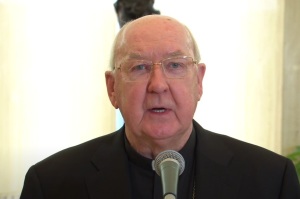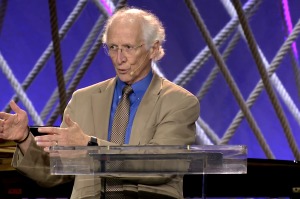The Controversy Over Adam and Eve Heats Up
Each generation of Christians faces its own set of theological challenges. For this generation of Evangelicals, the question of beginnings is taking on a new urgency. In fact, this question is now a matter of Gospel urgency. How are we to understand the Bible’s story, if we can have no confidence that we know how it even begins?
In terms of the Gospel of Jesus Christ, the most urgent question related to beginnings has to do with the questions related to the existence of Adam and Eve as the first parents to all humanity and to the reality of the Fall as the explanation for human sinfulness and all that comes with sin.
A report from Barbara Bradley Hagerty of National Public Radio a few weeks ago is an undeniable sign that even the secular world now recognizes that this is a question central to Christianity. Hagerty, a skilled religion reporter, talked to me and several others about this subject. Her interviews were broadcast as a report on August 9, with Steve Inskeep of NPR as host.
Inskeep got right to the point: “For many Evangelicals, a historical Adam and Eve is a critical part of their theology, but now some conservative religious scholars are saying, publicly, that they can no longer believe it.”
Hagerty asked Dennis Venema, a professor of biology at Trinity Western University, if all humans descended from Adam and Eve. “That would be against all the genomics evidence that we’ve assembled over the last 20 years, so not likely at all,” Venema said. He explained that there is simply too much genetic diversity among human beings than would be possible with an original reproducing pair. Venema affirmed the standard evolutionary line of argument and explained that, in Hagerty’s words, “modern humans emerged from other primates as a large population - long before the Genesis time frame of a few thousand years ago.”
Hagerty then talked to John Schneider, who taught theology at Calvin College for many years. Schneider took the argument even further. As Hagerty reported: “Schneider, who taught theology at Calvin College in Michigan until recently, says it’s time to face facts: There was no Adam and Eve, no serpent, no apple, no fall that toppled man from a state of innocence.”
Now, we face a broader assault on the Bible’s main storyline. Schneider leaves no doubt about the radical nature of his proposal: “Evolution makes it pretty clear that in nature, and in the moral experience of human beings, there never was any such paradise to be lost. So Christians, I think, have a challenge, have a job on their hands to reformulate some of their tradition about human beginnings.”
At this point, we are looking at a repudiation of the Bible’s account of beginnings. We are not talking about an argument over the interpretation of a few verses or even chapters of the Bible. We are now dealing with the straightforward rejection, not only of the existence of Adam and Eve, but of both Eden and the Fall. Look carefully at Professor Schneider’s words - “there never was any such paradise to be lost.”
Though shocking, this line of argument is not really new. The new development is the fact that growing numbers of Evangelicals are apparently buying the argument.
There are others pushing the same lines of argument. Darrel Falk and Kathryn Applegate, writing at The BioLogos Forum, responded to the NPR report with an article that repeatedly affirms the claim that Adam and Eve could not have been the primal and solitary human pair. They argue that science is unable to resolve the question of Adam and Eve as a whole, but they write: “All science can say is that there was never a time when only two people existed on the earth: it is silent on whether or not God began a special relationship with a historical couple at some point in the past.”
Later, they argue that “the most [science] can say is that there were never just two individuals who were the sole genetic progenitors of the entire human race.” They also claim, again, that “genetics convincingly shows that there was never a time when there were just two persons.”
Ever since the challenge of Darwin and evolutionary theory appeared, some Christians have tried to argue that the opening chapters of the Bible should not be taken “literally.” While no honest reader of the Bible would deny the literary character of Genesis 1-3, the fact remains that significant truth claims are being presented in these chapters. Furthermore, it is clear that the historical character of these chapters is crucial to understanding the Bible’s central message - the Gospel of Jesus Christ.
The Apostle Paul, for example, clearly understood Adam to be a fully historical human who was also the genetic father of the entire human race. The fall of the human race in Adam sets the stage for the salvation of sinful humanity by Jesus Christ. But now, Professor Schneider is telling us that “in the moral experience of human beings, there never was any such paradise to be lost.”
Karl Giberson, who has also been affiliated with BioLogos and is the author of Saving Darwin: How to be a Christian and Believe in Evolution, goes so far as to argue that the biblical account of Adam and Eve “was never intended to be read as literal history.” But, he was asked, what does this then say about the Bible’s truthfulness and authority?
Giberson then wrote:
The Bible is not a book. It is a library - dozens of very different books bound together. The assumption that identifying one part as fiction undermines the factual character of another part is ludicrous. It would be like going into an actual physical library and saying “Well, if all these books about Harry Potter are fictional, then how do I know these other books about Abraham Lincoln are factual? How can Lincoln be real if Potter is not?” And then “Aha! I have got you! So much for your library.”
That is an amazing and deeply troubling paragraph. Giberson uses the metaphor of the Bible as a library of books - a metaphor popularized by author Brian McLaren. But Giberson then goes where many others lack the courage and candor to go - he is ready to identify part of the Bible as “fiction.” In his words, “The assumption that identifying one part as fiction undermines the factual character of another part is ludicrous.” What can his argument mean but that Adam is to be understood as like Harry Potter, a fictional character, while Jesus is like Abraham Lincoln, an historical figure who really existed?
The implications for biblical authority are clear, as is the fact that if these arguments hold sway, we will have to come up with an entirely new understanding of the Gospel metanarrative and the Bible’s storyline.
The denial of an historical Adam and Eve as the first parents of all humanity and the solitary first human pair severs the link between Adam and Christ which is so crucial to the Gospel.
If we do not know how the story of the Gospel begins, then we do not know what that story means. Make no mistake: a false start to the story produces a false grasp of the Gospel.





























